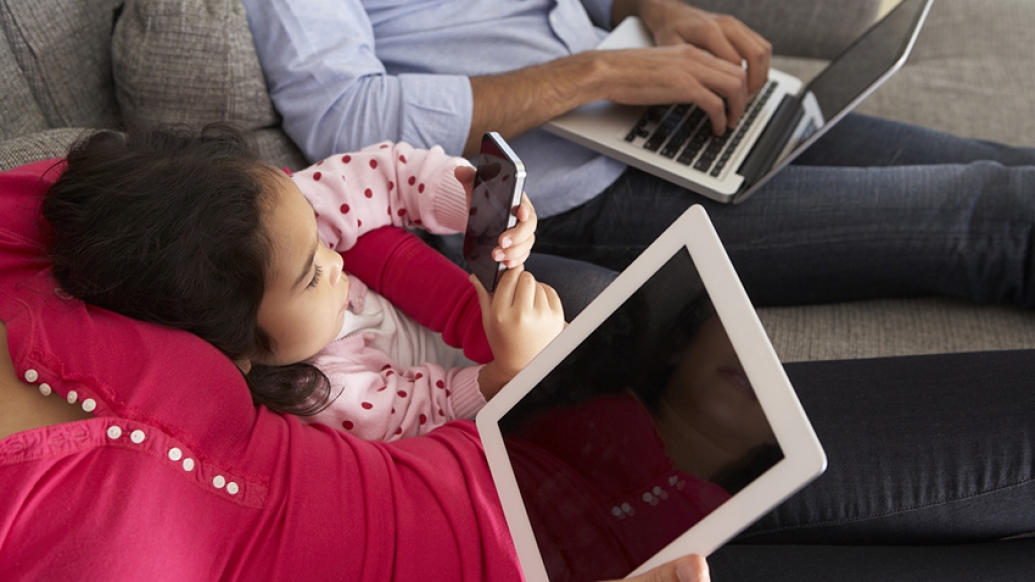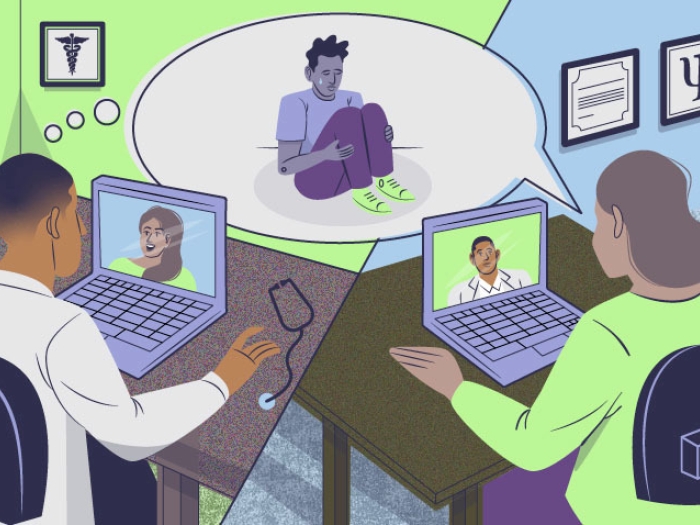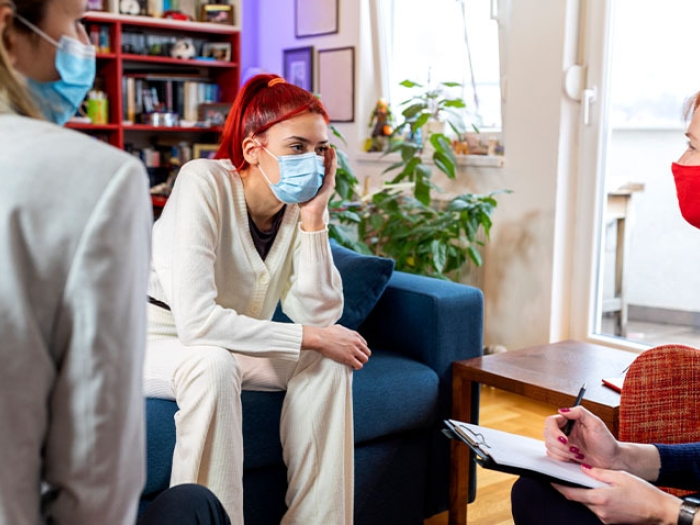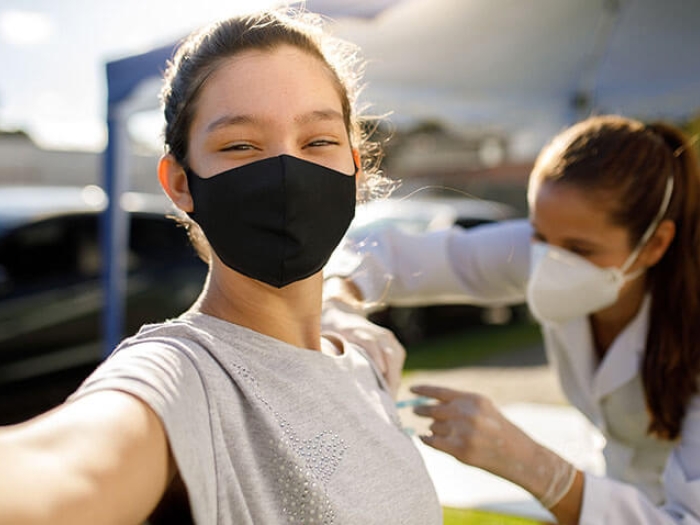Technology means work and other outside pressures can’t be avoided at home. These blurred boundaries may make it difficult to be present with kids.
7:00 AM
Author |

A parent gets home from work just as a new email "dings" on his or her phone. At the same time, the toddler is calling out for a snack, and his big brother would really like to show off his Lego creation.
MORE FROM THE LAB: Subscribe to our weekly newsletter
Meanwhile, the phone keeps buzzing — more emails, social media notifications, a breaking news alert and an "urgent" text.
As smartphones and tablets blur the lines between work, home and social lives, parents are grappling to balance it all, a new small study suggests. Parents' use of mobile technology around young children may be causing internal tension, conflicts and negative interactions with their kids, suggests a qualitative study in the Journal of Developmental & Behavioral Pediatrics.
It's a challenge both parents and health care providers should tune in to.
"Parents are constantly feeling like they are in more than one place at once while parenting. They're still 'at work.' They're keeping up socially. All while trying to cook dinner and attend to their kids," says lead author Jenny Radesky, M.D., a child behavior expert and pediatrician at University of Michigan C.S. Mott Children's Hospital who conducted the study with colleagues from Boston Medical Center.
"It's much harder to toggle between mom or dad brain and other aspects of life because the boundaries have all blurred together.
"We wanted to understand how this was affecting parents emotionally. We found that parents are struggling to balance family time and the desire to be present at home with technology-based expectations like responding to work and other demands."
Technology has transformed the way parents use digital media around their children.Jenny Radesky, M.D.
'The whole world is in your lap'
The study involved in-depth interviews with 35 caregivers, including moms, dads and grandmothers. Participants consistently expressed an internal struggle between multitasking mobile technology use, work and children, information overload and emotional tensions around disrupting family routines, such as mealtime. As one mom in a focus group described it, "The whole world is in your lap."
Some caregivers also reported a trickle-down effect. Their emotional response to whatever they were reading on their mobile device — whether it was a work email or bad news — sometimes affected how they responded to children. Study participants also described more attention-seeking behaviors from children when caregivers were heavily attentive to their mobile devices, which prompted negative interactions, such as snapping at kids.
At the same, caregivers said that mobile technology provided "an escape" from the boredom and stress of parenting and home life demands. One mom said that after long days with kids, plugging into the outside world was a reminder: "I have a life beyond this."
Other boons of mobile technology included: more ability to work from home (when digital connection to work could be kept in check); easier communication with estranged family members by allowing a more "filtered" view of their life; and serving as a tool to keep peace and quiet in the house.
"You don't have to be available to your children 100 percent of the time — in fact, it's healthy for them to be independent. It's also important for parents to feel relevant at work and other parts of their lives," Radesky says.
"However, we are seeing parents overloaded and exhausted from being pulled in so many different directions."
Parents are estimated to use mobile devices, such as tablets, smartphones and wearables, nearly three hours a day. But few studies have explored the role these technologies play in family interactions.
Radesky and colleagues wanted to explore the issue further after an observational study of caregivers eating with young children in fast food restaurants. In that study and subsequent videotaped research, her team found that parent mobile device use is associated with fewer verbal and nonverbal interactions with the children.
"Technology has transformed the way parents use digital media around their children," Radesky says. In comparison to traditional distractions like books, she says mobile technology requires a greater emotional investment and its demands on caregivers' attention are unpredictable.
"Kids require a lot of different types of thinking, so multitasking between them and technology can be emotionally and mentally draining. As clinicians, we have an opportunity to start conversations with parents and help them manage this conflict with ideas on how to unplug and set boundaries."
With all this in mind, physicians can recommend some ideas for families struggling to stay unplugged.
Get screen time under control
Set boundaries. Create a family plan that includes unplugged spaces or times of day. For example, you may abolish tech use at dinnertime or bedtime. Or maybe it's right when you get home and your kids are excited to see you. Maybe you plug in your device in a certain room and only use it there or agree not to use it in certain areas of the house (i.e. kids' bedrooms).
Track your mobile use. Consider creating a filter or block on your device to avoid the temptation of tech use at home. Apps like "Moment" and "Quality Time" may also help you track mobile use and see where you may be spending too much time. If 90 percent of your time is on Facebook or work email, for example, you can think of ways to cut down technology time for these purposes.
Identify top device stressors. Think about which parts of your mobile device use are most stressful for you. If it's reading the news or checking work email, for example, reserve these tasks for times when you know your kids are occupied. This way, you have your own time and space to process the information rather than interrupting time with kids, who may react to your negative emotions with their own negativity.
For a Spanish-language version of this article, click here.

Explore a variety of healthcare news & stories by visiting the Health Lab home page for more articles.

Department of Communication at Michigan Medicine
Want top health & research news weekly? Sign up for Health Lab’s newsletters today!





